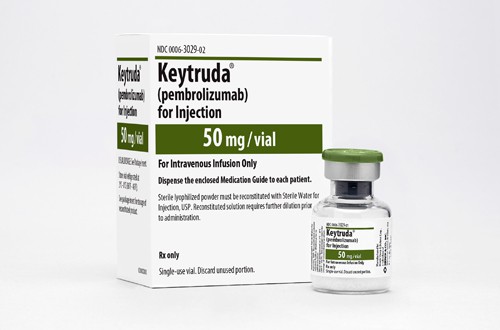
Merck & Co is already the dominant force in first-line non-small cell lung cancer (NSCLC), and looks set to retain that title with another positive late-stage trial.
In the KEYNOTE-042 trial, PD-1 inhibitor Keytruda (pembrolizumab) improved overall survival compared to platinum hemotherapy when given on its own to ‘all-comer’ patients with locally advanced or metastatic NSCLC, including those with both squamous and non-squamous types and a full range of PD-L1 expression levels from 1% and above.
It’s worth noting that rival PD-1 inhibitor Opdivo from Bristol-Myers Squibb was unable to show a benefit as a monotherapy in that patient population, a finding which effectively handed the first-line NSCLC immunotherapy market to Merck’s drug.
Merck’s head of R&D Roger Perlmutter said the trial provided further evidence that Keytruda is a “foundational treatment for NSCLC”, having shown consistent benefits on survival both as a monotherapy and in combination with chemotherapy. In January, the drug become the drug in the PD-1/PD-L1 class to improve overall survival when given in combination with chemotherapy in previously-untreated patients in the KEYNOTE-189 study.
Specific results from the monotherapy study haven’t yet been revealed – Merck says it will present the numbers in full at a future medical meeting – and the trial will continue until data on progression-free survival (PFS) is mature.
Keytruda is already approved as a first-line monotherapy for NSCLC is patients with PD-L1 expression levels of 50% or more, so the new results mean it can now be used in more than two thirds of all patients presenting with this common form of cancer. The difference in outcome between the Merck and BMS studies is interesting, and it’s not yet clear whether there is some difference between the drugs or simply the protocols used in the studies.
That’s not to say Merck’s position in first-line NSCLC is assured – particularly as the data from the latest trial is still under wraps. Roche’s Impower150 study of PD-L1 inhibitor Tecentriq (atezolizumab) plus Avastin (bevacizumab) and chemotherapy has shown robust PFS data in previously-untreated non-squamous NSCLC patients, and AstraZeneca and BMS are both hoping to find a role for combinations pairing PD-1/PD-L1 inhibitors with CTLA4 inhibitors.
AZ’s combination of Imfinzi (durvalumab) and tremelimumab missed the PFS endpoint in the MYSTIC trial last year but is continuing to an overall survival read-out. Meanwhile, in February the CHECKMATE-227 trial of BMS’ combination of Opdivo and Yervoy (ipilimumab) showed a significant benefit on PFS in first-line NSCLC patients with high TMB, regardless of PD-L1 expression.




